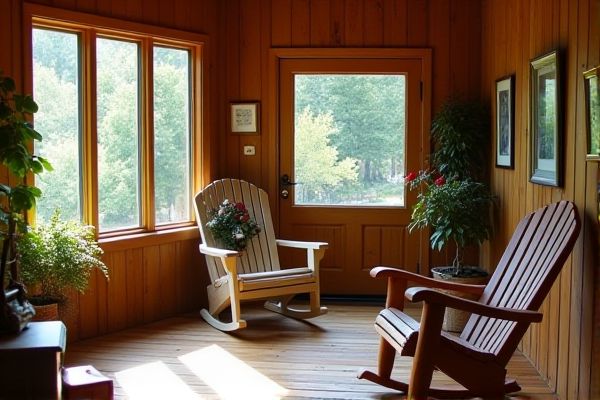
Rocking chairs provide a gentle back-and-forth motion that enhances relaxation, making them ideal for porches or nurseries, while Adirondack chairs boast a sturdy, reclined structure with wide armrests perfect for outdoor lounging and enjoying nature. Discover which chair suits Your comfort and style needs by exploring the detailed comparison in the rest of this article.
Table of Comparison
| Feature | Rocking Chair | Adirondack Chair |
|---|---|---|
| Design | Curved rockers for smooth rocking motion | Wide armrests, slanted seat, and high back |
| Primary Use | Indoor and outdoor relaxation with rocking | Outdoor seating for comfort and lounging |
| Material | Wood, metal, or plastic options | Primarily wood, sometimes plastic or composite |
| Comfort | Gentle rocking motion aids relaxation | Ergonomic sloped design supports posture |
| Portability | Generally heavier due to rocker base | Lighter and easier to move |
| Best For | Relaxing indoors or on porches with motion | Outdoor patios, gardens, and decks |
Introduction to Rocking Chairs and Adirondack Chairs
Rocking chairs feature curved legs that allow a gentle back-and-forth motion, providing relaxation and comfort primarily indoors or on porches. Adirondack chairs are characterized by their wide armrests, slanted seat, and high back, designed for outdoor lounging with a sturdy wooden frame. Both chair styles offer timeless appeal but serve different functional and aesthetic purposes in home and garden settings.
Historical Background of Each Chair Style
The rocking chair, originating in early 18th-century America, was designed for comfort and relaxation with its curved rockers enabling a gentle back-and-forth motion. In contrast, the Adirondack chair was introduced in the early 1900s in the Adirondack Mountains by Thomas Lee, characterized by its slanted seat and wide armrests, crafted specifically for outdoor leisure. Understanding the distinct historical backgrounds of these chairs helps you appreciate their unique design evolution and cultural significance.
Design and Construction Differences
Rocking chairs feature curved legs that allow smooth back-and-forth motion, often constructed with slatted or solid wood seats and high backs for comfort. Adirondack chairs are distinguished by their wide armrests, slanted seat, and tall, fan-shaped back, designed for outdoor relaxation with sturdy, weather-resistant wood such as cedar or teak. The rocking chair's pivoting mechanism contrasts with the fixed, reclined posture of the Adirondack chair, emphasizing different ergonomic and aesthetic purposes.
Comfort and Ergonomic Features
Rocking chairs offer soothing back-and-forth motion ideal for relaxation and stress relief, featuring contoured seats and curved rockers that support natural body movements. Adirondack chairs emphasize ergonomic design through wide armrests, deep seats, and slanted backrests, promoting excellent lumbar support and comfort for extended outdoor seating. Both chair types prioritize comfort but serve different ergonomic needs, with rocking chairs enhancing dynamic motion and Adirondack chairs providing stationary, posture-friendly support.
Material Choices and Durability
Rocking chairs are often crafted from hardwoods like oak and maple, providing sturdy durability and a smooth rocking motion, while Adirondack chairs typically utilize weather-resistant materials such as cedar or polywood to withstand outdoor elements. The dense grain of hardwoods in rocking chairs offers longevity and resilience for indoor and covered porch use, whereas Adirondack chairs are designed with slatted backs and seats in rot-resistant wood or synthetic alternatives, enhancing their lifespan against sun and moisture exposure. Choosing between the two depends on the intended environment, with Adirondack chairs excelling in outdoor durability and rocking chairs favoring traditional indoor comfort.
Indoor vs. Outdoor Suitability
Rocking chairs are primarily designed for indoor use, offering gentle motion and comfort suitable for living rooms and nurseries. Adirondack chairs, made from durable materials like treated wood or plastic, excel in outdoor settings due to their weather-resistant construction and wide armrests ideal for holding drinks or books. While rocking chairs enhance indoor relaxation, Adirondack chairs provide sturdy, comfortable seating for patios, gardens, and beaches.
Aesthetic Appeal and Style Options
Rocking chairs offer a timeless, classic aesthetic with curved runners and a traditional silhouette that complements both rustic and modern interiors. Adirondack chairs are known for their wide armrests, slanted back, and sturdy, casual design, making them a favorite for outdoor settings with various color and material options. Your choice between these chairs depends on whether you prefer the elegant motion of a rocker or the bold, laid-back style of an Adirondack.
Maintenance and Care Requirements
Rocking chairs typically require regular tightening of screws and periodic lubrication of moving joints to maintain smooth motion, especially if made from wood or metal. Adirondack chairs, known for their sturdy, slanted wooden slats, generally need less frequent maintenance but benefit from protective sealants or paint to prevent weather-related damage and wood splitting. Both chair types should be stored indoors or covered during harsh weather to extend their lifespan and reduce fading or deterioration.
Cost Comparison and Value
Rocking chairs typically cost between $150 and $500, offering a blend of comfort and traditional style, while Adirondack chairs range from $100 to $300, valued for their sturdy design and outdoor suitability. Your choice depends on whether you prioritize the soothing rocking experience or the casual, low-profile seating ideal for patios. Investing in a high-quality Adirondack chair often provides better durability and weather resistance, enhancing long-term value in outdoor settings.
Which Chair Should You Choose?
Choosing between a rocking chair and an Adirondack chair depends on your preferred outdoor experience and comfort needs. Rocking chairs offer soothing motion ideal for relaxation and gentle rocking, while Adirondack chairs provide ergonomic support with wide armrests and a reclined seat perfect for lounging. Consider the setting and desired functionality--rocking chairs suit porches and calm environments, whereas Adirondack chairs excel in open spaces like patios or gardens.
 homyna.com
homyna.com